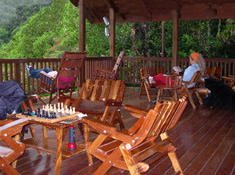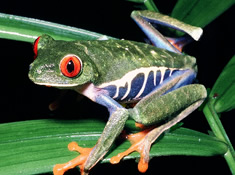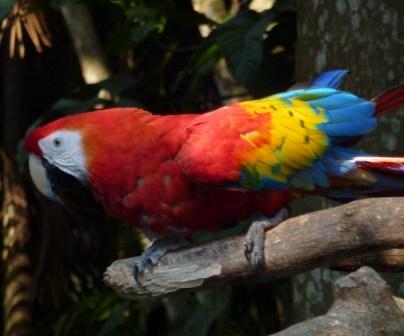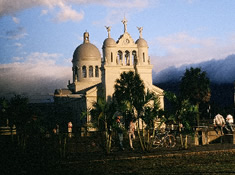Costa Rica
*The Costa Rica program is not currently active*
Oregon International Education Consortium
Study Spanish and Field Biology/Ecology in Costa Rica
(info archive from June 27 July 27, 2014)
The Oregon International Education Consortium consists of Central Oregon Community College, Chemeketa CC, Clackamas CC, Mount Hood CC, Portland CC, and Rogue CC, offering programs ranging from 3 to 11 weeks in four countries. On the COCC campus, you can get your questions answered during one of the Winter informational meetings or by contacting one of the advisors listed at the bottom of this page.
The Program
Your Spanish language skills are the first target in this program. After arriving in San Jose airport on Saturday, June 27, you begin your adjustment to the tropical climates with a night at the Hotel Mango in the nation's capital San Jose. A chartered bus will then take you to Grecia. Here, you will spend two weeks at the Academia Centroamericana de Espanol in Grecia, studying intensive Spanish and earning 4 credits of college Spanish at your level of proficiency. While learning Spanish, students will experience Costa Rican culture via their homestays, salsa lessons, a cooking class, and tours of Grecia, nearby Sarchi, and the capital San Jose. Field Biology classes will also begin in Grecia on Tuesdays and Thursdays. The 4-credit biology course, designed for non-science majors, is open to all students with an interest in learning more about distinct ecosystems of the tropics (variously numbered BI 103, 141, 188, or 200). The four biology class meetings in Grecia are highlighted by tours to Zoo Ave, World of Snakes, and INBioparque.
After completing the Spanish class students and instructors will enjoy a fiesta on Friday, July 11 to say goodbye to Grecia. On Saturday the entire group will head off for the day to Poas Volcano and La Paz Waterfall Gardens. On Sunday, July 13 your study of field biology relocates at the University of Georgia's tropical research station, Ecolodge, in the Monteverde Cloud Forest. During the five days in this unique ecological zone, from July 13 to July 18, students can take advantage of the 13 kilometers of trails and the scenic overlook of the continental divide.
Leaving the Cloud Forest of Monteverde on July 18, students head to two more ecological zones. First students study for three days, from July 18-21, at the Palo Verde Biological Station on the Pacific slopes of Guanacaste Province. There the dry forests interact with the moist riparian zone of the Tempesque River. These contrasting natural forces forces creates rich wildlife habitats, from swampy forest to saltwater marshes, and excellent seasonal and migratory bird-watching.
Students board a chartered bus on July 21 to leave Palo Verde for the last biological field station of the Summer 2014 itinerary, La Selva. The field biology course is completed here at the La Selva Biological Research Station, where students will spend six days studying tropical rainforest ecology in the Caribbean-side foothills. Taking advantage of the heavy precipitation and the confluence of two rivers at this large private biological reserve, an abundance of wildlife thrives at La Selva and the nearby Cordillera Volcnica Central Biosphere Reserve.
Learning activities in the wildlife biology class continue through July 26, including a birding tour, a natural history seminar and research in La Selva's laboratory.
The group returns to San Jose International Airport on Sunday, July 27 to leave on an afternoon flight and arrives in Portland at 11:30 that night.
Optional trips (not included in program fee) include a full day visit to Jaco Beach and a canopy tour with a zipline in the Monteverde Cloud Forest. Program fee of $3900.00 includes airfare, lodging, trip cancellation and medical insurance, all meals (except your lunches in Grecia), transportation by private bus and taxis between study sites, and National Park entrance and tour fees; 8 credits tuition is extra, paid to the consortium student's home college. Fee also does not cover cost of Costa Rica's airport departure tax (currently $29.00)
The Academia Centroamericana de Espanol (ACCE)
ACCE is in Grecia, in the province of Alajuela, about thirty miles northwest of the capital, San Jose. Homes in Grecia have most of the modern conveniences you are used to. The school is within walking distance from your homestay. It has some computer and WiFi availability.
Family Stays
Your host family will meet you at upon your return from the La Selva Biological Station. They will help you become familiar with the area, particularly the area around the school. During your two weeks at the ACCE language school, host families provide you with breakfast and dinner, but not lunch. You may either buy foods at a local grocery store for making cold lunches, or purchase snacks at the ACCE cafeteri
Language Classes
 Before you leave Oregon, register for the level of Spanish that you have not yet studied
(SPAN 101, 102, 103, 201, 202, 203, 211, 212, and 213 are available). Some colleges
have placement exams if you are unsure, or you may want to speak with a Spanish instructor.
At ICLC, you are also tested and placed according to Spanish language ability: Superior,
Advanced, Intermediate, Novice. By Tuesday of the first week, classes are taught entirely
in Spanish-no translations. This is total immersion! So prior Spanish study is recommended.
Before you leave Oregon, register for the level of Spanish that you have not yet studied
(SPAN 101, 102, 103, 201, 202, 203, 211, 212, and 213 are available). Some colleges
have placement exams if you are unsure, or you may want to speak with a Spanish instructor.
At ICLC, you are also tested and placed according to Spanish language ability: Superior,
Advanced, Intermediate, Novice. By Tuesday of the first week, classes are taught entirely
in Spanish-no translations. This is total immersion! So prior Spanish study is recommended.
There are four students per instructor. Instructors are rotated, and groups can change as conditions dictate. Instructors utilize speaking, listening, music, video, literature and newspapers during the course of a day. Instruction is 4 to 5 hours per day, five days per week. You will accumulate more than the minimum 40 hours of Spanish instruction required by the Oregon college system for one term of college credit. In fact, you can accumulate over 50 hours of instruction, including the optional afternoon Spanish activities.
Extra-curricularActivities
Costa Rica is a safe country, and you are encouraged to travel on your own. In addition to independent exploration, optional excursions are available. Students can choose to visit Jaco Beach on Sunday, July 6, after the first week of Spanish lessons. The Monteverde Cloud Forest offers optional zipline tours of the tropical canopy. The services at La Selva biological station include optional wildlife and birding tours.
Palo Verde
 The Field Biology course heads to the Nicoya Peninsula, at Palo Verdean Organization
of Tropical Studies research and teaching site on Friday July 18. You travel from
Monteverde to the Pacific-side Guanacaste Province. Here, you will investigate some
of the thirteen different habitats, including mangrove and swampy forests, salty and
freshwater marshes, and dryland forests. The marsh in front of the field station is
an important feeding ground for 60 species of resident and migratory water birds.
You will also take a boat tour of the Tempisque River to observe nesting waterfowl.
Bring a small pair of binoculars if you have one!
The Field Biology course heads to the Nicoya Peninsula, at Palo Verdean Organization
of Tropical Studies research and teaching site on Friday July 18. You travel from
Monteverde to the Pacific-side Guanacaste Province. Here, you will investigate some
of the thirteen different habitats, including mangrove and swampy forests, salty and
freshwater marshes, and dryland forests. The marsh in front of the field station is
an important feeding ground for 60 species of resident and migratory water birds.
You will also take a boat tour of the Tempisque River to observe nesting waterfowl.
Bring a small pair of binoculars if you have one!
You will travel from the higher dry plains of Palo Verde to La Selva, a tropical rain forest reserve run by the Organization of Tropical Studies in the Caribbean foothills. Species diversity is amazing, including more than 1,850 species of plants, 350 of trees, 448 of birds, and 500 of ants! La Selva is one of the world's most important sites for tropical ecosystem research, including projects on forest dynamics, biodiversity, nutrient cycling, and native species reforestation. Tours include an introduction to birding. The two laboratories also support WiFi access.
The biology course heads to the first field station on Sunday, July 13. You will arrive at a research station high in the forested mountains northwest of San Jose. Ecolodge is a University of Georgia branch campus, including student union, computers, library, dining hall, classrooms, group dormitories or cabins, and lab facilities. You will spend five days here, learning about tropical ecology. Ecolodge, located near Monteverde--Costa Rica's famous montane cloud forest preserve--also has its own pre-montane forest, rich in plants and animals. Two terrific optional activities that yield a bird's-eye perspective on the rainforest are the Sky Walk Canopy Bridge Tour and Zipline ($55 extra). The biological station even features its own restaurant, the dinners served are said to be one of the best Costa Rican and Italian restaurants in Monteverde area.
Itinerary
 WEEK ONE: After departing from Portland Airport at 6:00 am Friday June 27, the group will arrive
in San Jose, Costa Rica at 8:47 pm and spend the night in the nearby Hotel Mango.
Saturday, a courtesy bus from the Spanish language school will pick up the group and
luggage for a trip to Grecia, where students will meet with their homestay families.
Everyone can ease into the new location with a Sunday walking tour of Grecia. The
language school will interview and test you for placement purposes. Spanish classes
at Academia Centroamericana de Espanol (ACCE) begin on Monday and run through Thursday
from 7:30 AM through 2 PM with a lunch break. On Monday at 2 pm, there will be a dance
class, Tuesday and Thursday at 2 pm, when there is a dance class. On Wednesday, July
2, there will be a field trip by public bus to the World of Snakes. In addition to
practicing Spanish, the group will use Friday, July 4, to travel to Ciudad San Jose.
Saturday at 9 am, the group will go by ACCE buts to INBioparque in Heridia. An optional
full-day excursion to Jaco Beach (a $55 cost) rounds out the week on Sunday, July
6.
WEEK ONE: After departing from Portland Airport at 6:00 am Friday June 27, the group will arrive
in San Jose, Costa Rica at 8:47 pm and spend the night in the nearby Hotel Mango.
Saturday, a courtesy bus from the Spanish language school will pick up the group and
luggage for a trip to Grecia, where students will meet with their homestay families.
Everyone can ease into the new location with a Sunday walking tour of Grecia. The
language school will interview and test you for placement purposes. Spanish classes
at Academia Centroamericana de Espanol (ACCE) begin on Monday and run through Thursday
from 7:30 AM through 2 PM with a lunch break. On Monday at 2 pm, there will be a dance
class, Tuesday and Thursday at 2 pm, when there is a dance class. On Wednesday, July
2, there will be a field trip by public bus to the World of Snakes. In addition to
practicing Spanish, the group will use Friday, July 4, to travel to Ciudad San Jose.
Saturday at 9 am, the group will go by ACCE buts to INBioparque in Heridia. An optional
full-day excursion to Jaco Beach (a $55 cost) rounds out the week on Sunday, July
6.
WEEK TWO: After departing from Portland Airport at 6:00 am Friday June 27, the group will arrive in San Jose, Costa Rica at 8:47 pm and spend the night in the nearby Hotel Mango. Saturday, a courtesy bus from the Spanish language school will pick up the group and luggage for a trip to Grecia, where students will meet with their homestay families. Everyone can ease into the new location with a Sunday walking tour of Grecia. The language school will interview and test you for placement purposes. Spanish classes at Academia Centroamericana de Espanol (ACCE) begin on Monday and run through Thursday from 7:30 AM through 2 PM with a lunch break. On Monday at 2 pm, there will be a dance class, Tuesday and Thursday at 2 pm, when there is a dance class. On Wednesday, July 2, there will be a field trip by public bus to the World of Snakes. In addition to practicing Spanish, the group will use Friday, July 4, to travel to Ciudad San Jose. Saturday at 9 am, the group will go by ACCE buts to INBioparque in Heridia. An optional full-day excursion to Jaco Beach (a $55 cost) rounds out the week on Sunday, July 6.
WEEK THREE: Sunday July 13, the group travels from 8 am-12 pm to the Monteverde Cloud Forest. The group will settle in at Ecolodge San Luis, a learning and research facility run by the University of Georgia. You will spend 5 days here learning about the tropical forest, and completing the studies for the biology class. Among the activities will be a guided tour of the Cloud Forest, using pre-paid taxis for transportation. The optional zip line and canopy tour costs $65.00, offering an unusual perspective on the tropical forest. On Friday, July 18, the group heads to the Palo Verde Biological station in Guanacaste region. You spend Saturday and Sunday June 19thand 20th studying ecology in the unusual dry tropical forest. The station provides a boat tour of birds in the riparian habitat.
WEEK FOUR: On Monday, the group travels to La Selva Biological Station near Puerto Viejo de Sarapiqui. For four days, the group will learn field biology, including a birding tour, natural history seminar and research in the lab. The end of this week will be punctuated by the national Costa Rican holiday, the Annexation of Guanacaste is a national holiday on July 25, so anticipate business closures and some downtime. A chartered bus will take the group back to the San Jose airport for a flight departing at 2:02 pm and arriving in PDX at 11:36 pm with a connecting flight in Houston.
Questions? Contact your Oregon International Education Consortium Representative:
Sara Henson, Modoc 223, 541-330-4357, shenson@cocc.edu, or
OIEC statewide Coordinator, Jon Bouknight, Deschutes 6, 541-330-4394, jbouknight@cocc.edu.
Students wishing to apply must download and fill out BOTH the Costa Rica Application 2014 (4 page Word Document--turn in electronically) and the Costa Rica Release and Conduct Form (1 page Word Document--turn in via US post office).

